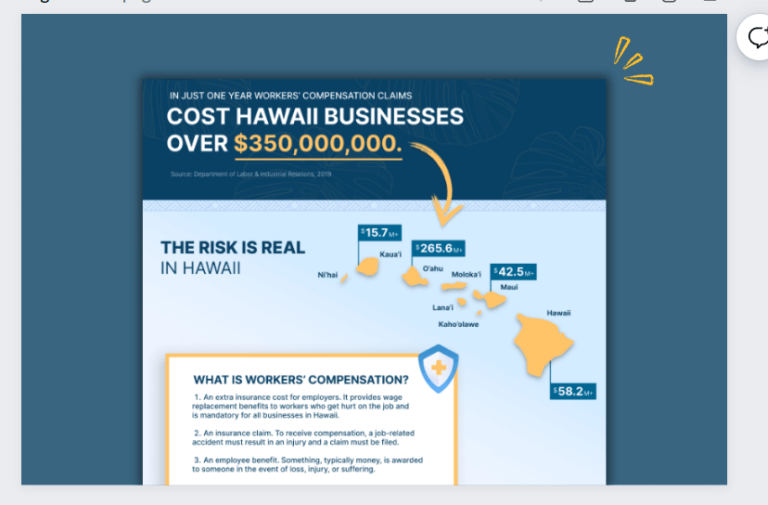Hawaii Adopts Pay Transparency Laws
Learn about Hawaii's new law that intends to increase pay transparency and reduce pay inequalities in the workplace.
If you're a Hawaii business owner with 50 or more employees, there is a new law on pay transparency you need to know about. On July 3, 2023, Governor Josh Green signed into law SB 1057, a bill that will enhance pay transparency and equal pay in the workplace — and this bill takes effect on January 1, 2024. So, what do you need to know? And what is pay transparency going to look like once the SB 1057 Hawaii bill goes into effect? Keep reading for more information, including bill details and steps to stay ahead of this new requirement.
What is the new pay transparency law in Hawaii?
Starting January 1, 2024, private employers with 50 or more employees in Hawaii must disclose the hourly rate or salary ranges on job postings and advertisements.
In addition to disclosing pay ranges, the new law EXPANDS the existing equal pay law by:
- Prohibiting employers from discriminating based on any protected class (instead of simply prohibiting pay discrimination based on sex.
- Requiring employers to provide equal pay for substantially similar work (instead of simply requiring them to provide equal pay for equal work)
Why it matters
Hawaii's pay transparency laws follow similar laws recently enacted in California, Colorado, and New York, intending to reduce pay inequality in the workplace by disclosing more pay information on job postings and advertisements. Not only does the Hawaii pay transparency bill benefit job applicants, but it benefits current employees too. How? It gives them visibility into wage ranges of open positions, reassuring workers that they are being compensated within a predetermined range and equitably relative to their peers.
Promoting pay transparency can also be hugely beneficial to employers too. By openly communicating about compensation, you're not just sharing numbers; you're building trust. This transparency facilitated in states with pay transparency laws eliminates speculation and creates an environment of openness, boosting morale and fostering loyalty. When employees understand how pay is determined, they see a direct link between their efforts and rewards, enhancing job satisfaction. It's a strategic move that signals your commitment to fairness and equality, aligning perfectly with the values of the modern workforce.s
Exemptions from the law
While the Hawaii wage transparency legal requirements apply to a variety of businesses, there are situations where it's not expected. Hawaii employers do not need to disclose wage ranges for job listings for internal transfers or promotions. Public employers and businesses with less than 50 employees are also not subject to this new rule.
Protected categories in Hawaii
“Protected categories” (sometimes referred to as “protected classes”) refer to groups of people legally protected from being harmed or harassed by laws, practices, and policies.
Protected categories/classes can vary by state, but in Hawaii, they include race, color, religion, ethnicity, ancestry, national origin, citizenship, veteran or military status, sex (including gender identity or expression), sexual orientation, reproductive health decision, pregnancy (including childbirth or related conditions and lactation/breastfeeding), marital status, age, physical or mental disability, genetic information (including testing and characteristics), arrest and court record, credit history or credit report, or domestic or sexual violence victim status (if the employer knows such status).
This means paying employees less than their peers for substantially similar work based on these protected categories is illegal and unacceptable. Instead, Hawaii's pay transparency laws affirm that employees who perform work “which requires equal skill, effort, and responsibility…under similar working conditions” must receive equitable pay.
Acceptable ways to pay employees differently
Pay equity doesn't mean everyone earns the exact same. It's about fairness and acknowledging individual contributions. When the salary range reflects the role and the category of the position, the diversity of benefits, compensation, and hourly rate are acceptable. There are legitimate employment criteria when pay differentials are acceptable, such as:
- Seniority or tenure in your organization
- Performance or merit
- Quantity or quality of production
- Bona fide occupational qualification
- Any differential except those protected categories listed above
Violation consequences
If you don't comply with Hawaii's pay transparency law, job candidates or current employees may file a complaint with the Hawaii Civil Rights Commission (HCRC), and ultimately, you could face a lawsuit related to the Hawaii SB 1057 bill.
What can Hawaii employers do?
Here are a few steps you can take before the law takes effect on January 1, 2024:
- Step 1: Inform your recruiters and hiring managers about Hawaii's pay transparency law, and let them know it will take effect soon. You can even share this blog post with them.
- Step 2: Pull an employee census report of everyone in your workforce and see if their current pay meets the hourly rate or salary ranges your open positions will soon advertise.
- Step 3: If certain employees are underpaid, correct discrepancies. One way is to give these employees merit increases.
- Step 4: Finally, review all job postings and update all listings on every job platform to include the hourly rate or salary ranges. And don't wait until December 31 to make changes. Update your job listings sooner rather than later.
Stay compliant with ProService
Want to stay compliant with today's ever-changing state and federal rules? Partnering with ProService can help! Our HR services keep payroll, benefits, and HR simple for busy employers and provide you with timely updates on critical changes to the business and HR landscape. Sign up for a free 15-minute consult and learn how we can help your people and business leverage the full benefits of pay transparency and best practices.









